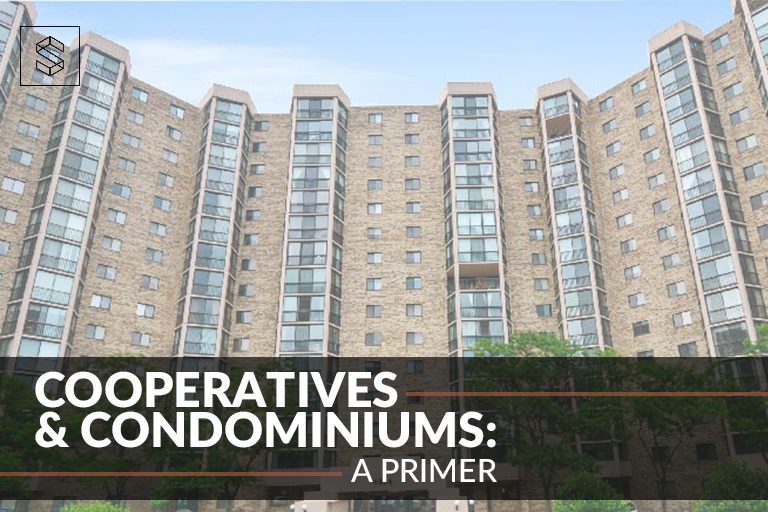
Washington, DC, the brainchild of Pierre L’Enfant, was one of the earliest forays into urban planning. The city was purposely designed to offer sweeping vistas, ample green space, confusing diagonal roads to bewilder an invading army (see Washington Circle at rush hour) and moderately dense habitation. Effectively, DC was designed as a livable, walkable city 200 years before that became the dream of every urban area in America.
This plan called for vertical living in the denser downtown areas, which included apartments and cooperatives. Found primarily in and around the oldest cities in America, cooperatives (co-ops for short) are a form of collective ownership that far pre-dates condominiums (condos for short).
Washington, DC has approximately 100 co-op buildings today. As a buyer considering purchasing a new home in a building, you can benefit from knowing the in and outs of owning a condo or a co-op:
Cooperatives
Co-ops are the older–and many would say more pure–way to take ownership in a building with other residences. Modern day cooperative ownership has roots in the late 1800s when renters in New York City apartment houses jointly purchased buildings from their landlord.
Ownership
Ownership in a co-op consists of a life-long leasehold to an individual unit paired with shares in the corporation that owns the building. The number of shares issued to a leaseholder is determined by the par value of the leasehold. In a simple example: if a co-op building has 100 units, all of which are the same size, then the par value for each unit will be 1% and the shares owned by each leaseholder will be 1% of the total number of shares in the corporation. Only leaseholders can be shareholders and vice-versa.
Financing
Because an owner in a co-op is not taking title to a piece of property, securing financing requires working with a lender who has a recognition agreement with the building. A recognition agreement is issued once a lender vets the organization structure and financing of the corporation and agrees to hold the shares in the corporation as collateral for a residential loan. The added layer of effort on behalf of a lender to lend in a co-op means that only a handful of lenders will be able to offer to finance to a buyer pursuing a co-op purchase. Send us an email at [email protected] for a list of the best co-op lenders and which ones to avoid.
Taxes
DC taxes co-ops at the building level. A single tax bill is issued for the entire building. The total bill is divided equally amongst the leaseholders based on par value and is collected as a part of the monthly fee. DC homestead deductions are available to co-ops if the makeup of the leaseholders meets the criteria set forth by DC.
Monthly Fee
The monthly fee collected from owners in a co-op covers, at a minimum, the owners’ pro-rated share of the property taxes, maintenance on the common areas of the building, reserve funds, trash removal, and a master insurance policy for the building. The fee can also include services such as front desk and maintenance staff and utilities that are not separately metered (water is nearly always common while gas and electric can be common or separately metered).
Settlement
Closing on a co-op unit requires approval from the co-op’s Board of Directors. Once that approval is issued, closing can proceed with the buyer signing their loan documents and new ownership documents. Settlement must take place at the co-op’s Transfer Agent (the equivalent of a title company for co-ops); in DC, the transfer agent for nearly all co-ops is EJ Flynn.
Unique features
While not universal, most co-op buildings prize their existence as a cooperative living arrangement and often the historical nature of their building. Co-ops tend to more strongly discourage investor owners. Co-ops in Washington are almost exclusively found in the older areas of the city, which lend them to being either historically protected buildings in and of themselves or to be located in a historic district.
Condominiums
Condo ownership came into being in the early 1960s and the ownership structure came as a result of the shifting way that building construction was originally financed.
Ownership
Ownership in a condo consists of taking title to an individual unit (commonly referred to as owning the ‘walls in’) plus purchasing an undivided share in the common elements of the building equal to the par value of the unit.
Financing
Obtaining a loan to purchase a condo unit uses the title to the unit as collateral for a residential loan. The lender will also require that the condo association meet certain basic criteria like having sufficient reserves, no pending lawsuits, etc.
Taxes
DC taxes each individual condo unit as a separate taxable entity. A unit owner is responsible for paying their tax bill bi-annually. All condo owners are eligible for a homestead tax deduction and a senior citizen deduction if certain criteria are met.
Monthly Fee
The monthly fee collected from condo unit owners covers, at a minimum, maintenance on the common areas of the building, reserve funds, trash removal, and a master insurance policy for the building. The fee can also include services such as front desk and maintenance staff and utilities that are not separately metered (water is nearly always common while gas and electric can be common or separately metered).
Settlement
Settlement on a condo consists of a buyer signing their loan documents and the seller signing the deed to the property over to the buyer. There are no ownership documents for the condo association but the buyer does sign that they agree to abide by the condo rules and regulations, will pay monthly dues, etc.
Unique Features
Condo buildings significantly outnumber co-op buildings in Washington and can be found throughout the city. A condo building can have as few as two units and there is no upper limit on the number of units allowed in a condo. Nearly all newly constructed buildings are condos.
You know the basics–now take the next step. If you have been thinking about purchasing a condo or co-op in Washington, DC or the surrounding area, we would love to help. Give us a call at 202.270.1081, email us at [email protected], or send us a message here to get started.

The Stokes Group is a team of dedicated professionals who have passion for the real estate business and will advocate for our clients with the utmost honesty, integrity, and confidentiality. We believe in building solid relationships with our clients and that starts by getting to know who we are. Follow us on Facebook and Instagram.

The Stokes Group is a team of dedicated professionals who have passion for the real estate business and will advocate for our clients with the utmost honesty, integrity, and confidentiality.




